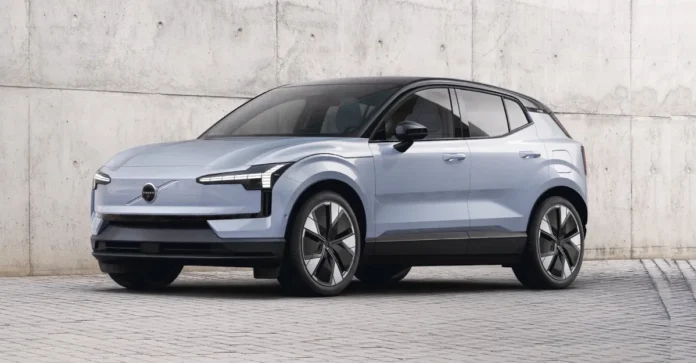Key Points
- Volvo EX30 SUV has the smallest carbon footprint of any fully electric Volvo car, at 23 tonnes per 200,000 km.
- Volvo aims to sell only fully electric cars by 2030, achieve climate neutrality by 2040, and reduce CO2 emissions per car by 75% by 2030.
- Volvo is a member of the FMC and collaborates with SSAB to explore near-zero emission steel for the automotive industry.
- EX30 features high proportions of recycled aluminum, steel, and plastics, aligning with Volvo’s goal of becoming a fully electric car company by 2030.
Volvo’s EX30 Advances 2040 Climate Neutrality Goal
Volvo has been actively working to reduce its carbon footprint through the development and production of electric vehicles. The Volvo EX30 SUV is highlighted as having the smallest carbon footprint of any fully electric Volvo car to date, with a total carbon footprint of 23 tonnes per 200,000 km.
This model is part of Volvo’s commitment to selling only fully electric cars by 2030, aiming to achieve full climate neutrality across its entire value chain by 2040. Volvo’s efforts include reducing CO2 emissions per car by 75% by 2030 and communicating improvements transparently, such as disclosing the carbon footprint of all new models.
The company is also a member of the World Economic Forum’s First Movers Coalition (FMC) and is collaborating with SSAB to explore near-zero emission steel for the automotive industry. Volvo’s transition to electric vehicles is seen as crucial in limiting climate change, with a focus on reducing emissions throughout its supply chain and operations.
The company’s commitment to sustainability is evident in its use of recycled materials in the EX30, with high proportions of recycled aluminum, steel, and plastics. Volvo’s goal is to become a fully electric car company by 2030, with a strong emphasis on reducing greenhouse gas emissions and promoting sustainable practices across its operations.
What is the carbon footprint of the Volvo EX30 compared to other Electric Vehicles?
The Volvo EX30 has the smallest carbon footprint of any fully electric Volvo car to date, with a total carbon footprint of 23 tonnes per 200,000 km. This figure represents a significant reduction compared to other models like the XC40 ICE (petrol). The EX30’s carbon footprint is approximately 60% less than the XC40 ICE model. The use of wind-based electricity to charge the EX30 substantially reduces its carbon footprint compared to global or European electricity mixes, highlighting the importance of investing in renewable energy infrastructure for electric cars to maximize their climate potential. Volvo’s commitment to transparency includes providing detailed reports on the carbon footprint of its electric cars, such as the EX30, to help customers make informed decisions when choosing sustainable transportation options.




